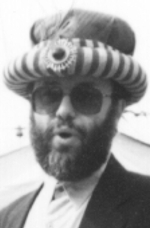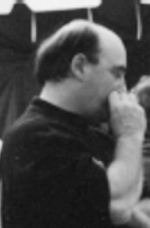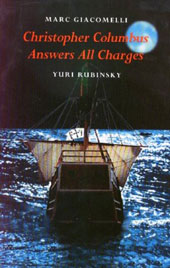The Porcupine's Quill
Celebrating forty years on the Main Street
of Erin Village, Wellington County
BOOKS IN PRINT
Christopher Columbus Answers All Charges by Yuri Rubinsky and Marc Giacomelli
This may be the most politically incorrect book of the year.
Five centuries have passed since Christopher Columbus’s famous voyage of 1492 and his place in history has never been so hotly debated. Columbus is blamed for everything from slavery and colonialism to the current state of the environment. He has been described as a megalomaniac, an incompetent seaman, an adulterer, an opportunist and a liar.
Yuri Rubinsky’s and Marc Giacomelli’s Christopher Columbus Answers All Charges gives the ‘Admiral of the Ocean Sea’ a voice so that he can defend himself against his accusers. Writing as a lonely old man in a villa in Valladolid, Columbus responds with bombast and wit to accusations that his voyages were religious expeditions disguised as voyages of business, that his voyages were business trips under the guise of sacred missions, and that he was obsessed by hats. To the charge ‘That I Prayed for the deaths of my enemies,’ he answers: ‘I have generally found that the death of an enemy, while a blessing, should not be considered a personal favour from the Almighty.’ To the charge ‘That I should have remained a cartographer, a calling in which I have some skill,’ his reply is: ‘Without cartographers, there can be no progress. Without explorers, there can be no cartographers.’ The resulting book is a humorous and provocative re-examination of Christopher Columbus’s claims to fame.
Review text
Yuri Rubinsky and Marc Giacomelli explore the intricacies of a historiographical voice in Christopher Columbus Answers All Charges. The double authorship of this novel is both suspect and effective, as the Admiral Christopher Columbus, in his old age and after great successes, claims authorship, justifying his actions and according himself the greatness of a discoverer. I resisted this book, expecting it to be a defence of Columbus, but I was utterly taken by the ironic humour of Rubinsky and Giacomelli’s sharp-witted construction. Here, the voice of Christopher Columbus announces his own perfection, proud of being first, pompously sailing off the edge of all maps. Columbus does list and answer all charges, beautifully inscribed at the top of each chapter under a baroque banner of headline, including such interesting variants as ‘That I prayed for the deaths of my enemies,’ and ‘That I allowed a stowaway girl to sail with me on the ‘‘Santa Maria’’ ’. Columbus answers general accusations, accusations concerning his origins, and accusations concerning his voyages as well as his sense of divine mission, with his infallible logic, a logic that undercuts completely the imperialist argument and shows the giddy sideshow of ‘discovery’ for what it was. In his responses, the fictionalized Columbus mixes bravado and vision, hard-core entrepreneurship and dream, but Columbus as an ordinary man -- his ambition, his bitterness, his squabbling, his persistent dissatisfaction with a world in which ‘small man of fact are asked to place value on the actions of those of vision’ -- comes through. Columbus’s answers are denials more than justifications, sometimes obstinate denials, sometimes contradictions, capturing the ambivalence of his presumed discoveries, an ambivalence nevertheless tempered by the novel’s interest in him as a historical figure. In the end, ironically, Columbus justifies nothing, only seals his own damnation; still, as a man of his time and circumstance, he becomes almost forgivable. At least the novel tackles the ambivalence of dreams, the dreams of men who seek difference, who seek to make changes to the known world, who crave adventure. This novel is a brilliant achievement of characterization; Columbus is truly ‘the first man to combine the virtue of humility with the necessity of arrogance.’ Was he a fool, a madman, a tyrant, a visionary, someone who embodied the notion that ideas can overcome blood? Or was he merely part of that terrible human urge to test his desires at the expense of others? Whatever the fictional Columbus claims, history is not over, as the irony of such a novel, especially one published in 1993, trumpets. Wry humour saves this book from its own self-destruction. The writing is good, the book is beautifully produced, and the tenor of this exploration is thoughtful and intelligent. It is almost enough to make the reader cry, ‘Come back Chris -- come back and speak up for yourself!’
—University of Toronto Quarterly
Review quote
‘Christopher Columbus Answers All Charges is manifestly a labour of love, and one feels the guiding hand of deep religious convictions on every page. Columbus here is also a wounded hero, suffering more for our sins than his own. He is thus granted by the authors a universality that enables this book to transcend itself, while still remaining tenaciously faithful to its original intentions. Clearly, it takes huge themes to distract these writers from using their enormous literary talent for purely satirical ends. Christopher Columbus would be grateful.’
—Toronto Star
Back cover copy
‘Christopher Columbus Answers All Charges is the latest collaboration by Yuri Rubinsky and Marc Giacomelli. Co-authors of The Wankers’ Guide to Canada (Seal/Bantam and Anthem Records), they adapted and directed Italo Calvino’s Invisible Cities for the 1981 Toronto International Theatre Festival and were managing editors of the 1984 April Fool’s Day edition of Not The Globe & Mail. Yuri Rubinsky was president of SoftQuad and founding co-director of The Banff Publishing Workshop. Marc Giacomelli is a partner in the Naked Creative Consultancy. A long-time Creative Consultant for Second City Television, he produced Bob and Doug McKenzie’s Great White North. He is also the author of A Paranoid’s Guide to Them (Macmillan).
Yuri Rubinsky was a writer, software executive, and well known promoter of the Standard Generalized Markup Language (SGML), which was the basis for the now-ubiquitous XML. In Canada, he is probably best known as founding co-director of the influential Banff Publishing Workshop and for his work in applying technology to help visually impaired people. He died on January 21, 1996 after suffering a massive and unexpected heart attack.
Yuri was an author of both fiction and scholarly material, a publisher, and most importantly a visionary. His books include A History of The End of The World (1982), The Wankers’ Guide to Canada (1986) and (as co-author, with Marc Giacomelli) the novel Christopher Columbus Answers All Charges (1993). He was editor of Charles Goldfarb’s The SGML Handbook (1990) and SoftQuad’s The SGML Primer (1991). At the time of his death he was working on SGML on the Web (1997) which was completed by his friend and colleague Murray Maloney.
Marc Giacomelli is a partner in the Naked Creative Consultancy. A long-time Creative Consultant for Second City Television, he produced Bob and Doug McKenzie’s Great White North. He is also the author of A Paranoid’s Guide to Them (Macmillan).
The Porcupine's Quill would like to acknowledge the support of the Ontario Arts Council and the Canada Council for the Arts for our publishing program. The financial support of the Government of Canada through the Canada Book Fund (CBF) is also gratefully acknowledged.






